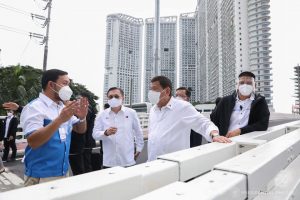Philippine President Rodrigo Duterte has admitted that the United States’ donations of COVID-19 vaccines prompted him to save the two nations’ Visiting Forces Agreement (VFA), an important defense pact that he has repeatedly threatened to scrap.
“We did a give and take. We thank them and I made a concession. I conceded the continuance of the Visiting Forces Agreement, in gratitude,” Duterte said in a televised address on Monday, according to Rappler’s translation of his comments.
A crucial element of the security alliance between Manila and Washington, the VFA lays out rules for the deployment of U.S. troops in the Philippines, and has gained increasing importance in the light of China’s increasingly assertive actions in the South China Sea.
President Rodrigo Duterte announced the tanking of the VFA in February 2020, after a close ally was refused a U.S. visa. But the Philippine leader held off on putting the final nail in the agreement’s coffin, announcing three successive six-month stays of the cancelation.
Last week, Philippine Defense Secretary Delfin Lorenzana announced that Duterte canceled the termination of the agreement between Manila and Washington after his meeting with U.S. Defense Secretary Lloyd Austin. The move stabilized the U.S.-Philippine alliance that has been rocked by the Philippine leader’s shoot-from-the-hip governing style.
The announcement came two weeks after the Philippines received over three 3 million doses of the Johnson & Johnson vaccine from the United States. The country also took possession of 3 million more doses of Moderna vaccine that arrived yesterday.
“I’d like to thank the President of the United States, Biden, the government, and the people of America for not forgetting us. Do not forget us because we share the same outlook in geopolitics, especially in Southeast Asia,” Duterte added in his address. Earlier, Presidential Spokesperson Harry Roque stated that “there is a good possibility” that the vaccine donations contributed to the decision of Duterte to keep the VFA.
The move marked a significant turnaround from his early months in office, when Duterte shocked the U.S. government, and many in the pro-U.S. security and political establishment, by spurning Washington and embracing Beijing. In October 2016, Duterte paid a visit to Beijing, during which he and announced his “separation from the United States” and promised his Chinese hosts that he had “realigned” himself in their “ideological flow.”
But Duterte’s revelations are mostly unsurprising. For months, he has been telling the U.S. it would have to pony up COVID-19 vaccines in exchange for preserving the pact. “If they are not able to deliver a minimum of 20 million vaccines, they better get out. No vaccine, no stay here,” Duterte said during a meeting with government officials. Then, in February, he informed the U.S. government, “from now on, you want the Visiting Forces Agreement done? You have to pay.”
A similar point was made in May by presidential spokesperson Harry Roque, who told the press, “We still don’t know if they will really send vaccines or how many will they send. So let’s wait for it to arrive first.
As I suggested last month, the repeated suspensions of the VFA’s retraction suggested that Duterte was unlikely to follow through on his threat to cancel the agreement, particularly given China’s repeated assertions of power in Philippine-claimed regions of the South China Sea and the overwhelmingly pro-U.S. inclinations of Manila’s foreign policy and security establishment. Instead, he seemed bent on leveraging his country’s geopolitical position to extract concessions from the U.S. government.
In that sense, it is little different from the motivations for Duterte’s swing toward China. To be sure, this was partly driven by resentment toward the Obama administration’s criticisms of his bloody “war on drugs,” in addition to a residue of anti-U.S. sentiment dating back to his days as mayor of Davao City in Mindanao. But it was also geared at harnessing Beijing’s Belt and Road Initiative to contribute to his administration’s “Build, Build, Build” infrastructure scheme, even if that has so far come to little.
Such a concession was also probably necessary for Duterte in a political sense. Facing strong pressure from the Philippines’ security establishment to reinstate the VFA, the U.S. donation of COVID-19 vaccines likely also granted Duterte a face-saving way of backing down on his threat to cancel the pact.
The lesson of this zig-zagging affair is that nothing Duterte says – neither his fulminations nor his praise – is fully irreversible or insulated from more mundane calculations. This alone indicates that tremors and uncertainties will continue to trouble the U.S.-Philippine alliance as long as Duterte is in office, which, to the undoubted relief of policymakers in Washington, will only be for the next 10 months.

































